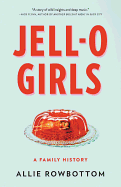
"We come from Jell-O," writes Allie Rowbottom in Jell-O Girls, her memoir detailing her family's intertwined legacy with "America's Most Famous Dessert." In 1899, her great-great-great uncle Orator Woodward bought the Jell-O patent for $450 ($4,000 today). Twenty-six years later, the patent was sold for $67 million.
Woodward's marketing and advertising savvy shaped the sugary, gelatinous product into one of the world's most successful brands. His family's wealth transformed LeRoy, N.Y., where Jell-O was manufactured: "just down the street from Orator's house, the river outside the factory running colorful and sweet, changing color weekly depending on the flavor."
However, Jell-O stained more than the town's water. Some of the Woodwards--especially Rowbottom's mother, Mary Jane Fussell--believed that their wealth was responsible for "the Jell-O curse," an explanation used for "all manner of familial misfortune." Many Woodwards suffered from some combination of mental and physical illnesses, abuse, alcoholism and financial ruin; several died by suicide.
With candid and unflinching descriptions connecting the history of Jell-O, feminism and her mother's unpublished writings, Rowbottom makes a case that the curse wasn't physical, emotional or confined exclusively to their family. Instead, the curse was a repressive societal attitude "reflected by the messages about women and their worth that her family sold with each box of Jell-O." Even the product's advertising depicted women and girls fitting into a perfect mold and stifling their voices.
Jell-O Girls is a fascinating family history combined with an examination of an iconic brand. Through it Rowbottom shows the interconnectivity among women and the continued need for amplification of their voices. --Melissa Firman, writer, editor and blogger at melissafirman.com

